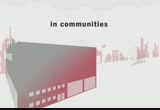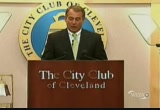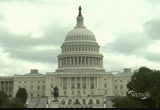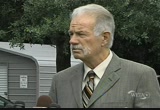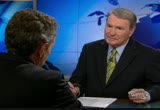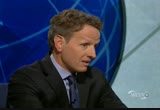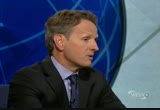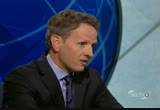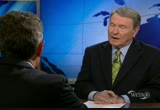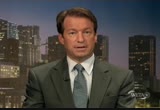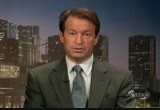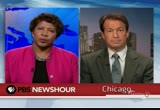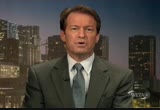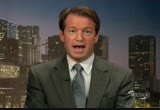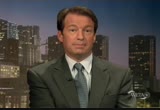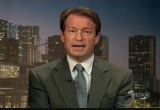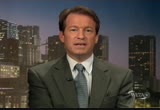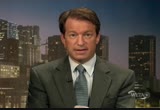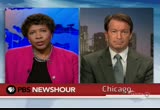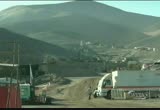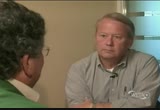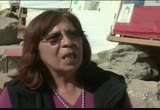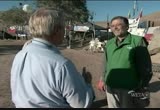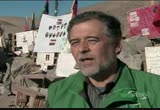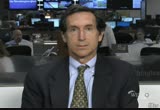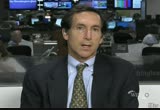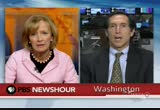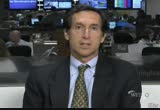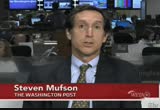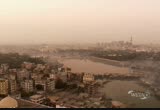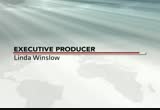tv PBS News Hour PBS September 8, 2010 7:00pm-8:00pm EDT
7:00 pm
>> lehrer: good evening. i'm jim lehrer. president obama today proposed $300 billion in tax incentives for business. >> ifill: and i'm gwen ifill. on the "newshour" tonight, we speak to treasury secretary timothy geithner and republican congressman peter roskam of illinois about the president's proposals to jump start the economic recovery and create new jobs. >> lehrer: then, tom bearden reports from chile on the trapped miners and their relatives above-ground. >> it's been a long and lonely vigle for the families of the miners trapped underground, and there's no end in sight. >> ifill: judy woodruff talks to stephen mufson of the washington post about a b.p. internal report, which blames the largest offshore oil spill in history on a series of human and mechanical failures. >> lehrer: and, global post reporter solana pyne looks at dhaka, bangladesh-- the fastest growing of the world's mega- cities and one of the poorest.
7:01 pm
>> i think if you simply project the present into the future, then we are headed no good place. >> lehrer: that's all ahead on tonight's "newshour." major funding for the pbs newshour has been provided by: this is the engine that connects zero emission technologies to breathing a little easier, while taking 4.6 million truckloads off the road every year. bnsf, the engine that connects us.
7:02 pm
and the william and flora hewlett foundation, working to solve social and environmental problems at home and around the world. and with the ongoing support of these institutions and foundations. and... this program was made possible by the corporation for public broadcasting. and by contributions to your pbs station from viewers like you. thank you. >> lehrer: the president accused the republicans of being fiscally irresponsible, but admitted that his own policies have not worked as quickly as hoped. congressional correspondent kwame holman reports. >> we got some business to do today.
7:03 pm
>> reporter: just eight weeks from election day, the president made his pitch in cleveland today to help the sputtering u.s. economy >> that means making long-term investments in education and clean energy; in basic research, technology, and infrastructure. >> reporter: and he also took a stand against extending the bush era tax cuts for the top 2% of earners, setting up a pre- election fight with republicans in congress. he accused the g.o.p. of being mr. obama repeatedly singled out republican house leader john boehner, who spoke in cleveland two weeks ago about his party's economic agenda. >> there were no new policies from mr. boehner. there were no new ideas. they would have us borrow $700 billion over the next ten years to give a tax cut of about $100,000 each to folks who are already millionaires. >> reporter: sustained unemployment near 10% and flagging growth are the main reasons the president's party is staring down potential major
7:04 pm
losses in the congressional mid- term election. trying to limit the economic and electoral damage, the president conceded that his recovery plans haven't worked fast enough, but he also sought to define the stakes he sees on election day. >> it's still fear versus hope; the past versus the future. it's still a choice between sliding backward and moving forward. >> reporter: mr. obama has called for more targeted stimulus spending and small- business tax breaks including $50 billion in infrastructure spending to upgrade or rehab roads, railways and runways. mr. obama also is proposing a permanent extension of a tax break on research and innovation and a more than $100 billion business tax cut, that would allow companies to write off all new investments over the next 14 months. on the bush era tax cuts, the president made clear he wants those affecting middle and lower income americans to continue.
7:05 pm
>> we are ready, this week, to give tax cuts to every american making $250,000 or less. >> reporter: on a.b.c. this morning, republican leader boehner said he was open to some of the president's ideas but again pushed to keep all of the bush tax cuts in place. >> you can't have a strong economy if you're raising taxes on the very people you expect to invest in economy to begin hiring people again. >> reporter: boehner also called on the president to work with congress on a budget that would hold to 2008 spending levels. >> ifill: we'll explore the president's tax cut proposals in back-to-back interviews with treasury secretary geithner and republican representative roskam, that will be followed by a report from chile on the physical and mental stress of the miners; the many failures in the b.p. oil spill, and the burgeoning slums of bangladesh. but first, with the other news of the day, here's hari sreenivasan in our newsroom.
7:06 pm
>> sreenivasan: the pastor of a small church in florida refused to back down from plans to burn copies of the koran on the 9th anniversary of the 9/11 attacks. the controversial protest has drawn widespread criticism from the obama administration, military commanders, and religious leaders. but pastor terry jones said he has also received a lot of support ahead of saturday's demonstration. >> our burning of the koran is to call the attention that something is wrong. something is wrong. it is possibly time for us in a new way to actually stand up, confront terrorism. as of right now, we are not convinced that backing down is the right thing. so on september 11, we shall continue with our planned event. >> sreenivasan: in washington, the top two national security advisers in president obama's cabinet denounced the plans. defense secretary gates said it
7:07 pm
was ill-advised. and secretary of state hillary clinton urged jones and his church to back down. >> it's regrettable that a pastor in gainesville, florida with a church of no more than 50 people can make this outrageous and distressful, disgraceful plan and gets you know the world's attention, but that's the world we live in right now. it doesn't in any way represent america or americans or american government or american religious or political leadership. >> sreenivasan: jones has already received more than 100 death threats and said he has started carrying a pistol to protect himself. in afghanistan today, security forces in kabul beat back hundreds of angry customers trying to withdraw their savings from a branch of the country's largest private bank. the kabul bank is embroiled in a crisis that escalated last week, after its top two directors were forced to resign amid
7:08 pm
allegations of corruption. since then, afghans have removed more than half of the bank's $500 million in liquid cash. today, a spokesman for afghan president hamid karzai assured customers their savings are safe. police in pakistan announced plans to charge three men for helping a failed attack on new york's times square. the men face terrorism related charges for helping the bomber from afar, including sending him money. in may, faisal shahzad-- an american citizen-- drove an explosive packed s.u.v. into times square, but the bomb failed to detonate. shahzad has already pleaded guilty to terrorism and weapons charges in the u.s. related to the bombing. the government of iran today halted the stoning execution of a woman convicted of adultery, and said her case is under review. the sentencing of sakineh mohammadi ashtiani provoked an international outcry. adultery is the only crime that carries the penalty of death by stoning under sharia law. the iranian government said it
7:09 pm
was moving ahead with. mexican marines have arrested seven gunmen suspected of taking part in last month's massacre of 72 migrants near the u.s. border. four were arrested after a shootout last week with marines. the others were taken into custody several days later. investigators suspect the migrants were killed for refusing to work for the zetas drug cartel. on wall street today, stocks were up slightly in another day of light trading. the dow jones industrial average gained 46 points to close at 10,387. the nasdaq rose 20 points to close above 2,228. those are some of the day's major stories. now, back to jim. >> lehrer: and now to treasury secretary timothy geithner. i spoke to him earlier this evening about president obama's speech today. mr. secretary, welcome. >> good to be here, jim, thank you. >> lehrer: the republicans caused current economic mess and now are refusing to participate in helping fix it.
7:10 pm
is that legitimately-- is that a legitimate description of what the president's message was today? >> jim, i'm the wrong person to ask about politics or messages, as you know, but what i can tell you is this, which is this crisis was much more damaging than almost anybody thought. it's going to take us a longer time to dig out of this hole. it's going to be harder because the damage was so severe and so savage, plus it's going to take time. we have now been growing for more than a year . the private sector-- the private sector, not the government it's private sector has now created more than three-quarters of a million jobs. we saw job growth come back sooner than the last two recoveries. part of the economy are actually doing reasonably well. i don't know, the american companies thatic mat things the world needs were very innovative very productive but parts of the economy are very hard, very tough. what the president is trying to do and our responsibility in washington is to figure out ways to help reinforce this recovery,
7:11 pm
get people back to work more quickly. what the president laid out today was the smartest most sensible set of ideas we could fiend to help reinforce this process of recovery. >> lehrer: he said over and over again, he said it not for the first time, but he said it over and over again today, he inherited this, that this didn't happen on his watch. this happened on the other watch. >> but that's, of course, unassailably true. when the president took office, the american economy, the envy of the world, was falling off the cliff. growth was declining at an annual rate of 6%. we were losing three-quarters of a million jobs every month. the american financial system was in freefall. people were wondering whether they should keep their money in banks, whether they should buy treasuries, the first time since the great depression that happened. that was the reality when this president came into office. and there was no way out of that except for the president working with the fed and the congress to dp take aggressive, strong, bold actions to arrest the freefall and start the economy growing again.
7:12 pm
and that's what he did, and that's what's happened. but these things -- these recessions doesn't capture it. crises caused by financial crises, they take time to heal. we have a lot more work to do, and rks again, our responsible is to do everything we can to make sure we find ways to get washington to act, to strengthen private investment, get people back to work. >> lehrer: is it correct to say, had there been a different president and a different set of officials in the government of the united states before, this would never have happened? the crisis itself? >> lehrer: yes. >> oh, absolutely. the financial crisis was caused by a set of policy choices that we made as a country over a significant period of time , certainly the decade before that. so we saw financial institutions across the country take on a huge amount of risk without restraint. you saw the government of the united states living way beyond its means. borrowing from future
7:13 pm
generations to finance a set of programs and tax cuts without paying for them. now, lots of other things contributed to this crisis, but the crisis was much more damaging because of those basic judgments and it's going to be much harder to solve, take more time to solve because of those basic judgments. those were consequences of policy choices. now , they weren't solely responsibility of the previous president or republicans during that period of time. but the crisis was made worse by and made much harder to solve because of the cumulative policy choices that happened the decade before this president took office. >> lehrer: is the politics of today making it much more difficult to solve now? >> it is making it harder to solve 12k34re78 explain the difference-- from your point of view, as secretary of the treasury, where are the politics get 234g your way to do what you think should be done? >> i'll describe it in two very practical ways. the president the president of
7:14 pm
the united states outlipd earlier this year a set of targeted, very sensible measures to help get people back to work more qukly, help make sure we're helping cushion and repair the damage caused by this, expending unemployment insurance, getting more money to states, so they can keep teachers in the classroom, provide support for small businesses, tax inceptives for small businesses,. now, it is -- those were good sensible policies. congress has been working very hard to enact those policies . it's taken much longer than they expected because they've had no support and lots of option from republicans in congress. that's not a political statement. that's a reality. so the -- if there had been more on those measures sooner , the economy would be stronger today. there's another effect which is also very damaging and hard to quantify which is i think the american people 2079 see people in washington ,
7:15 pm
whose responsibility to govern, coming it and do things that will make the country stronger, and better not their time in disreal estate fighting over these things, and i think the spectacle of the american people see how hard it is in washington to get things done does not help confidence. there has been a lot of talk about confidence. in the face of that-- it's good to point this out-- in the face of that you are seeing businesses across the country start to invest again, private investment-- not public investment, not the government-- private investment in the united states expanded at an annual rate of 20% the first half of this year, stronger in the second quarter since the first quarter. that's encouraging. it's slowed since then, which is one reason it's a good idea to take additional action to help stimulate private investment. >> lehrer: so the obama administration should not accept-- does not deserve any blame for what has happened over the last two years to try to dig this out and for things not to happen quicker? >> think of the way-- again, i'm not the right person to ask about politics, jim-- but think about what the dominant debate
7:16 pm
has been over this country for the first part of '09, was the administration was doing too much for the economy, too quickly. what the president did was absolutely essential. nothing would have been possible without it. without the president of the united states and fresh acting aggressively to stop an economy in freefall, help put oi a financial fire, nothing would have been possible. you can look back and people will look back over time and say could you fund a way politically to go more? it's hard to worry that question now. you k see the president of the united states acted with speed and courage because he knew all the things necessary to start to arrest that crisis, repair the damage, were going to be politically unpopular, difficult to do, and he was willing to take that risk and he should have been because that was the responsible thing to do. >> lehrer: any reading of any political poll right now show that people don't believe that. >> i think this is the basic tragedy of how you think about financial crises. it's very hard for people to appreciate, particularly for americans at this time
7:17 pm
, what scale of risk is in terms of how bad things could have been, what was necessary--. >> lehrer: could have been. not are. >> exactly. and the action you that you have to take in a financial crisis are deeplyun popular. that's why most governments wait too long to act. that's why crises become much more expensive to solve. what the president did of the necessary census beginning of a foundation that grew out of this and of course we're not done. he sd from the beginning 1k3rk this is absolutely critical for people to understand,ee are going to keep at this until we are pair damage, have americans back to work, and we knew it was going to 20 take a stand effort over a long period of time. and we saw the president say here's what's next sdplim it must be a terrible disappoint to you as well as the president that things have not gone faster than they have. >> again, it's very hard 207b what would have been possible. the lesson--. >> lehrer: you didn't expect
7:18 pm
things to go quicker? you didn't expect unemployment-- >> i think the expectations of most people, most economists, compared to what people thought at the beginning of january of 2009 , you had growth come back more quickly , stronger than almost anybody wof predicted. i'll give you an example. when the president came into office, people thought it was going to take maybe $700 billion maybe trillions of dollars to soft financial crisis. but because of the impact of what the president and fed did, you know, we've recovered or left unspent more than three-quarters of the authority congress gave us to solve the financial crisis. we've knot that money back from the banks much more quickly. again, we've had much more impact on stabilizing things than we thought possible. the fact that this is going to take time is something we knew. americans were 11th beyond their means for a long period of time-- not just the government 50 and borrowing against future income to spend things in retrospect they probably cooperate afford.
7:19 pm
it will take time to rebuild savings. people think that's weakness but it's strength because there's no path to a more sustainable recovery for united states, that doesn't have to go through-- not just the financials, but americans starting to save again and you're seeing that happen. >> lehrer: the president mentioned house minority leader john boehner self times in his speech today. but boehner, as you know, a few days ago, said one of the first things the president ought to do is fire you, the secretary of the treasury, and other members of his team if he really wants to get things going on the economy. i suspect you think that's a really louz idea? >> it's not a new idea. it's an old idea. my wife had it first, i think, and i'm going to do this as long as the president asks me to do. >> lehrer: mr. secretary, thank you. >> nice to see you, jim. >> ifill: for a republican view, we turn to illinois congressman peter roskam. he serves as a republican department whip and is helping to shape the public policy
7:20 pm
agenda for the fall elections. welcome, congressman. >> thank you. >> ifill: we just heard secretary geithner say but for the action of the obama administration, things would be much, much worse. we might perhaps be headed towards a depression? do you disagree to that? >> i think that is an overstatement. i think in fairness to the president, he inherited a difficult economic situation. there's no doubt about that. secretary geithner was sort of arguing in the alternative. he was referring in some cases to the actions that took place in the fall of 2008, with the intervention of the tarp and some to stimulus argument. ultimately, i think we will never know where the economy would have been but we do know where the economy is right now. the economy is in a place the administration told us we would never see. secretary geithner and other members of the administration said unemployment would peak at 8%, just declaratively, 23 only the stimulus bill would be passed. i don't know
7:21 pm
, the secretary said now president obama has put forth the smartest, most sensible policy. we've seen that rhetoric before, and it's clearly underperformed, and i think the american public, and a know a whole host of business in my district are interested in a different pathway. >> ifill: one of the policies the president was selling today in ohio, was the notion that the bush-era tax cuts should end right now, something even his advisors have disagreed 0. what is your view? >> peter orzag, the budget chief who is leaving and also dr. christina romer, as you pointed out, who heads up his-- is the chairman of his council of economic advisors, have bog, isly said raising taxes at this point isn't helpful. and where i disagree with the president is the notion of somehow not extending the '01, and '03 tax cuts for everybody along the line. the president is basically saying, we're going to do the class envy play.
7:22 pm
and i say, ultimately, you know, you look at 94% of small businesses that file under the individual tax rate, this is going to have an adverse impact on them. i just don't think the president's approach so far has created environment where companies want to get in and invest. and i think he would be well served and we all would be well served if he changed his position and said we're going to extend those and make those more predictable for everybody. >> ifill: what peter orzag said is they should be extended for two years and then ended? >> that's right. >> ifill: the president has also proposed kind of a-- they're not using the word "stimulus" but additional spend, tax credits for business. that doesn't balance this out in your view? >> think about it. from president's point of view, he is actually arguing in the alternative. on the one hand he's saying putting more business-- more money in the part of business' hands through the research and development tax credit, making
7:23 pm
that permanent, that's a good thing. but by the same token, why in the very same bill do you then take tax dollars away from the very entities that you're trying to induce to go further and more robustly into the marketplace. i think the president's approach is internally inconsistent. if you want to create predictability-- which is what i'm hearing from small 23w4ss my district-- then make the tax cuts permanent, get control on the spending side, which actually has an adverse impact on long-term economic growth, and that's from testimony before president obama's own debt commission, do those types of things and sml to the marketplace that you're serious about a are strained government instead of an expansive government. we've seen where more expansive government leads. it leads to a nagging unemployment rate of about 10%. >> anthony: a couple of things the president and his advisors have been saying. one is by continuing these tax cuts, you're putting the economy in a $700 billion hole. that number keeps coming back.
7:24 pm
we heard secretary geithner say it, and they also said what the republicans want to do is hold middle class tax cuts hostage. your chance to respond. >> no, we certainly don't want to hold middle class tax cuts hostage. we're strong advocates of middle class tax cuts and for tax cuts for those in the lower end of the economic spectrum. but this argument that you mentioned a minute ago is actually coming from an administration and a congressional majority and a secretary of the treasury that have guided our pathway to tripling our national debt in 10 years. i don't know, nondiscretionary, nondefense spending under president obama and superior court pelosi and majority leader reed have gone up 84%. now, those types of number rz staggering. but i do think it's ironic that the very group that has been pushing the outer edge of the envelope from a spending point of view are now sort of wringing their hands saying this costs too much. and only in washington, d.c. can you come up with a mentality that says that allowing individuals and company w40z have earned money to keep their
7:25 pm
money is a cost. i just don't think it's selling right now. >> ifill : let's talk about solutions fair moment. you also heard the president go around the country and saying republicans-- if i told them the sky was blue, they would tell me that it wasn't, that they only are the party of no. what are your solutions? >> well, think we're clearly not the party of no. in fact, there was an alternative to the stimulus that was offered back in the geng of 2009 that using, again, dr. christina roemer's peer re1r50ud research would have created twice the jobs at half the cost. there was an alternative to the health care plan that would have brought costs down. there was an alternative to cap and trade it as relates to energy, a better budget and so forth. but that's in the past. moving forward, what are our ideas? first and foremost, create predictability in the marketplace. all of this ambiguity has created so much tension that business and small business in particular, which is the real
7:26 pm
job creator, is saying you know what? i'm going to sit still. i don't know what the ground rules are and i want to know what the ground rules are moving forward. our idea, we talked about it, is to make the tax cuts permanent, first and foremost. secondly, get control on the regulatory side. i was in a meeting today with a business not five miles this studio in north chicago, and they said we don't know how much health care is going to cost us next year, and as a result , we're reluctant to bring new people on because we don't know what the regulations r going to lead to. and then finally, from a spending point of view-- and i referenced this a second ago-- spending is out of control actually has a drag on the economy. a university of maryland researcher recently testified before the president's commission and said once you get above a 90% on the debt-to-g.d.p. reichio, once you trigger that number, then it kofz you a million dollars a year. we're now at a 93% debt-to-g.d.p.
7:27 pm
ratio. when you restrain spending, that has a bouncey to the economy. in a nutshell, those would be the things we concentrate on first and foremost, not moving on to a bigger spending agenda. >> ifill: let's separate that out. you talked about job 1k3r5egz how douthat, and this president has one theory about it, and you have another. and the other is deficit concerns. separate them out. we know what the complaints are. but what would you do that would be different from what the president talks. doing. there is some where you would agree, i knowledge. >> we have seen where the president's plan has brought us. let's be clear about that. there's really nob-- except for secretary geithner-- that says the economy has a solid footing right now. most people are looking at the economy and they're feeling very very tepid about it and very concerned. so we-- we know that the borrow-and-spend mythology that says we're going to create
7:28 pm
prosperity that way, that's a faulthood. the problem is, in my view, president obama and his leadership has basically said we're going to continue on that pathway in some ways. so i don't think you can borrow any more without getting right on the edge of a greek debt crisis. now, as it relates--. >> ifill: what can you do? what can you do? i guess i'm trying to get paf ways in which the secretary is wrong and the ways in which you would fix it. >> from a job's point of view, i would go back to creating certainty in the marketplace through tax policy, through restraining spending that actually, as i argued, has a boyant effect on the economy when it's under control, and more predictability as it relates to health care. think for example the impact the health care bill has on the economy. we were told throughout the debate this was going to bend the cost kurvg. we all remember that sort of language, buttumly, it turned out not to be true. the congressional budget office, a whole host of other third-party and nonpartisan groups have looked at this and
7:29 pm
said actually health care coffs r going to be going up. that's not the direction that we need to be going in this country. expufrl, not withstanding the president's rhetoric and the full complain mode he's in right now, the reality is that businesses are looking out at this environment and largely looking at anti-business rhetoric that seems to be coming from washington, d.c. i think we can change that fairly quickly. i'm not saying it's easy. i'm not saying it's simplistic. but i am saying it is straightforward. >> ifill: congressman peter roskam of illinois, republican, you thank you so much. >> thank you. >> lehrer: next, the vigil goes on at the mine in chile for the families, for medical teams and for the 33 miners who have survived under ground for more than a month. "newshour" correspondent tom bearden is there. >> reporter: it is a miserable
7:30 pm
place to camp out-- a windswept saddle of jagged rocks that have been extracted from the gold and copper mine over the years as miners tunneled to reach the ore veins. margarite lagos fuentes pitched her tent at the edge of the industrial road that leads to the mine. she's been here for just over a month, contending with the heat and the dust kicked up by heavy trucks by day and near freezing temperatures after the sun goes down. her son claudio lagos is among those buried nearly half a mile beneath the mountain. tell us about your son. >> ( translated ): he's okay. he is better than before. just like us, he's waiting for the rescue. >> reporter: mrs. lagas had last spoken with him through a television link on monday. what kind of spirits was your son in? >> ( translated ): very good. he was worried about his daughters asking about them and interested in how his families doing. >> reporter: how are you holding up yourself?
7:31 pm
>> ( translated ): the pain of a mother is especially intense, and when he gets out, i just want to tell him i love him and i want to give him a hug. it's very emotional, all this, but i'll be extremely happy when he gets out. >> reporter: a nasa team advising the chilean rescue operation said that getting the miners out is just one part of a long process of helping them reintegrate into society. dr. jorge diaz anaiz supervises the 14 medical doctors assigned to the rescue team. >> ( translated ): i'm very worried because it is a long time. i'm especially worried about their mental health. some of them have been treated for nervous conditions so they
7:32 pm
>> reporter: chief psychologist alberto iturro says most of the miners are in good spirits, but says they're beginning to push back. yesterday, they told him they wanted a break from talking to psychologists. and some miners are complaining that they aren't getting all the mail their families have been sending. >> ( translated ): they will probably get angry a lot. the situation isn't pleasant and they are never going satisfy everyone. but this is a good sign, because it shows they want to overcome this situation. >> reporter: rescue officials said the miners were cheered by being able to watch a soccer match between the chilean and ukranian national teams yesterday afternoon, while their families watched in a tent on top of the mine. but there is no escaping the harsh conditions underground. the temperature is constantly in
7:33 pm
the high '80s. humidity is very high, and the ground itself is damp. many of the men have fungus problems, and infections could turn dangerous. >> ( translated ): because of the high temperatures and humidity, they are at risk of infection and disease so we've given them vaccinations and the care they need. >> reporter: how difficult is it to treat patients you can't physically touch. >> ( translated ): we have audio visual equipment that allows us to look at the miners from near and far. they're in stable health. except for a few who have chronic diseases, like diabetes, but we are treating them. >> reporter: one of the miners, 50-year old jonny barrios, has limited medical training, but doctors have called on him to administer inoculations and treat wounds. >> ( translated ): and miner jonny said he would do it.
7:34 pm
>> reporter: zulemy barrios is jonny's sister. she's keeping watch on top of the mountain. she says there's a good reason he knows how to give medical aid. >> ( translated ): yes. he learned from his mother, because she was asthmatic. >> reporter: so he learned this so he could take care of his own mother? >> ( translated ): si. from his mother. >> reporter: you must be pretty proud of him. >> ( translated ): yes. yes, very happy that he can help all the miners. >> reporter: while rescue officials paint an official, optimistic picture of the situation, tensions are rising elsewhere in the camp. elizabeth segovia's brother dario is part of the trapped mining crew. she says people with only tenuous connections to the miners have been arriving, hoping to get a share of the money the miners have been
7:35 pm
promised. >> ( translated ): some of the men have ex-wives or girlfriends and now, all of a sudden, they care about their exes. i'm here, i love my brother. but there are people who have there are some people that heard there was money and now they're coming out and finding out how they can get their part of it. but that's not what we need at the mine. we need those who give love and support. >> reporter: dr. iturro agrees the focus has to remain on the men in the mine >> ( translated ): what's important is what's happening below the ground and how they're dealing with that. and when the miners come out and get back to life, then they can deal with the rest of this stuff. >> reporter: every family member we talked to said they'd stay on this mountain until the last man does come out. >> ( translated ): i've been here since the first day and i'll be here until he gets out.
7:36 pm
it's cold and it's difficult. but the love for family is stronger than ever and that's keeping us okay. >> reporter: despite all the problems so far and all that are to come, dr. iturro says what he has seen is nothing short of amazing. >> ( translated ): the mental state of the miners is incredible for what they have lived through. they were not selected for this they have not been trained for this but they have still managed to survive in a way no human beings have ever been able to before. >> reporter: the hope now is they can continue to survive the months it will take to rescue them. >> ifill: now, b.p. releases its own investigation of what was behind the oil spill-- a report that's being heavily disputed. judy woodruff has the story.
7:37 pm
>> woodruff: the 193-page report describes the incident as quote, "an accident that arose from a complex and interlinked series of mechanical failures, human judgments, engineering design, operational implementation and team interfaces." b.p. goes on to admit some errors, but also cites crucial mistakes by rig owner transocean and cement contractor halliburton. in statements today, transocean said the report was a self- serving attempt to conceal, quote, "b.p.'s fatally flawed well design," and halliburton cited a number of omissions and inaccuracies. numerous hearings about who was to blame have been held on capitol hill since the april accident. b.p. released a video today alongside the report, voiced by the company's lead investigator. >> we concluded that there was no single action or inaction
7:38 pm
that caused the accident. instead, we found that there were eight inter-related and contributing factors that led to this tragedy. >> woodruff: those factors included a misinterpretation of a pressure test of the well's integrity by engineers and employees, and a failure by both companies on the rig to respond to warning signs of a well blowout. the report claims the blowout did not come up the outside of the well casing, but rather up through the center of the pipe. b.p. has been criticized for its decision to use a cheaper but riskier type of well casing. the government's point man on the spill response, retired coast guard admiral thad allen, said in a conference call today that other investigations are continuing. >> it is not the end-all-be-all of what's going to have to be done to address the issues of associated with this, about why it happened and what needs to happen in the future. >> woodruff: in its report and video, b.p. agreed that this is
7:39 pm
not the final word on what happened. just last weekend, a major piece of evidence, the 300-ton blowout preventer that failed to seal the well was hoisted out of the water for examination and sent to a nasa facility in new orleans, for government investigators to analyze it. meanwhile, b.p. faces legal hurdles, the u.s. department of justice is still considering criminal and civil charges. for more, we're joined by steven mufson. he's covering the story for the "washington post." steven, thank you for being with us. >> glad to be here. >> woodruff: first of all, how thur oi was this b.p. investigation? is it known? >> well, it it's about 243-page report, and it's pretty thorough. of course, there are a lot of things they don't have access to. they didn't have access to the blowout preventer, to a lot of the employees at other companies so it's not a complete look, but it's more than we've seen so far.
7:40 pm
>> woodruff: all in all, how much responsibility do they accept for what happened? >> they accept some responsibility for some decision-- their role in some of the decisions made on the well, but there's a lot of blame that they're spreading to the contractors who are working for them, contractors like haliburton who did the cement job, to transocean, who was operating the rig and the blowout preventer. >> woodruff: can you pin point what they themselves accept responsibility for? >> i think the closest we get to that is some decisions about whether they should have run additional tests at certain steps, and also the failure to recognize some of the warning signs that there were hydrocarbons in the well. but in those cases, they share that responsibility with transocean. >> woodruff: and they also say that the blowout happened through the center of the pipe
7:41 pm
rather than through the casing around the outside of it. >> right. the significance of this, judy, is that they've been very harshly criticized by a lot of people who say their well design was faulty, that they used too long a segment of pipe, that it wasn't attached to other components correctly, and here they're saying that no matter what you think of our well design, that wasn't the problem here, and that's not where the breakdown took place. >> woodruff : now, on what they say is the responsibility of transocean and haliburton, both of those companies are taking issue with them. >> absolutely. they've responded very vigorously saying that b.p. is ignoring all the mistakes it made, and that it's not really sharing the-- you know, it's not taking the responsibility that's really theirs. this is very important both for b.p.'s future and the justice department investigation and in lawsuits that might try to get
7:42 pm
b.p. to pay for some of the damages. >> woodruff: and are transocean and haliburton, are they presenting evidence to refute or to counter what b.p. is saying? >> not today. today most of the evidence is coming from b.p. . it's finding fault with the mixture of-- that haliburton used in its cement job, and it's also found fault with a piece of equipment that was made by a company called weatherford international that was supposed to block some of the gas and oil from flowing up the well in the event of a cement failure. >> woodruff: can you sum up how much credibility , steven, this report is being given? >> well, i think it's mixed, because on the one hand, it is a serious effort. they marshaled about 50 people inside of b.p. supposedly these people were sort of set apart. they came from parts of the company not involved in the gulf, and they've employed experts from outside the company as well.
7:43 pm
on the other hand, you know, they're still b.p. employees, and a lot of people are skeptical that they could really take the kind of tough look at b.p. that some of these other independent investigations that are still going on might do later on. >> woodruff: and is it possible to know how much this investigation is going to contribute to other official investigations into what happened? >> i think the significance-- this is drawing in part on some of those investigations. i think the real significance here is twofold-- one, it gives us a more detailed look at some issues that perhaps legitimate issues involving some of the b.p.'s contractors, but i think it also gives us a little glimpse into the defense that b.p. might deploy if it faces criminal charges from the justice department, or that it might deploy in some of the private lawsuit against it. >> woodruff: in other words,
7:44 pm
with any potential criminal case or legal case, i some say, against them, in mind. >> right. i mean, they've taken a lot of the responsibility by promising to pay $20 billion or $30 billion, whatever it takes to clean up and meet a lot of damages that are done to the economy of the gulf coast, but i think this is a sign that there is a limit out there and that they are prepared to make a vigorous argument that other people were also at fault. >> woodruff: all right, we'll leave it there, steven mufson, the "washington post," thanks so much. >> thanks, judy. >> lehrer: finally tonight: the population boom in the world's poorest urban areas. our report comes from a global post series about the growth of mega-cities. it centers on dahka, capital of the south asian nation bangladesh. this story was prepared by the team of erik german and solana pine.
7:45 pm
>> reporter: this is a good day for four-year-old shahadat. when he complained of hunger, his father had a piece of fruit to give him. >> ( translated ): when he tells me he's hungry, i try to bring him food after work. if i can't buy any food, he has to live with the hunger. >> reporter: abdur rahim's struggle to feed his family began three years ago. that's when one of south asia's biggest rivers, the brahmaputra, washed away the land his family had farmed for generations. >> ( translated ): my land was over there. now it's water. it's a river. >> reporter: he now drives a rented rickshaw in a town across from his former home and earns about a dollar a day. barely able to afford the rent for this windowless, mud-floored shack, he's decided to move his family to dhaka, the country's capital. he and his wife shapla say they'll borrow the $10 they need for the trip and catch a bus within the week, joining a wave of some 400,000 migrants who move to dhaka every year. >> ( translated ): i feel terrible, but we have to leave
7:46 pm
everyone we know, all our relatives and neighbors, and take our kids to an alien place. >> reporter: the city they're moving to is growing so fast, each new census is quickly outdated. but local experts estimate its now home to 15 million people. dhaka is perched on the leading edge of a global trend. for the first time in human history, the world has become more urban than rural. by mid-century, some 80% of the earth's population will live in cities, many of them in the exploding slums of the developing world. for good or ill, dhaka is setting an example. >> you are seeing the early future of the world, which is not a very pleasant thought at this point in time. half of the population of the developing world will be in the urban centers within the next decade. >> reporter: if you want to know what that might look like, dhaka is among the best places to visit. the world bank called it the fastest growing of the world's 20 or so mega-cities-- urban areas with populations over ten
7:47 pm
million. it's also one of the poorest. vast slums dot every neighborhood, and house at least a third of its people. in less than 15 years, the united nations predicts dhaka's population will surpass that of shanghai, mexico city or new york. >> well, i think that if you simply project the present into the future, then obviously we are headed to no good place. >> reporter: at the end of british rule in 1947, dhaka had just 250,000 residents. two and a half decades later, when bangladesh won independence from pakistan, the city had nearly 1.7 million. since then, rural poverty and frequent natural disasters have pushed bangladeshis to dhaka at breakneck speed, each new decade has seen the city's population double. everywhere, you can see the damage wrought by this frenzied growth. by one rough estimate, traffic alone costs the city $2 billion a year. >> i have adapted what i call car meetings.
7:48 pm
i take my colleagues with me in a car, with a computer, and we talk and we hold our meeting in the car over the two hours. >> reporter: raw sewage flows into lakes and rivers so polluted they're beyond treatment. electricity and water networks strain to cope with surging demand. protests erupt periodically when routine water shortages last more than a few days. >> believe me, a serious water crisis in the city can bring down a government. that kind of magnitude water has acquired. >> reporter: the new arrivals are often the hardest hit because most settle in slums. they have no title to the land they live on and can't get legal water or electricity. so they pay two, three even four times official rates for pirated, unreliable connections. >> if i'm a slum dweller, you know, i don't have access to basic services. i don't even have access to basic rights because remember, by definition, i'm illegally residing where i'm residing. >> reporter: but new migrants keep pouring in. some belong to bangladesh's growing middle and upper classes, who settle in the city's upscale neighborhoods.
7:49 pm
there, one-family villas are quickly being transformed into apartment complexes. but even those who end up in slums say moving to the city still offers the best chance for a better life. after moving to dhaka three years ago, mahmuda akhter found work in this garment factory. she now makes $36 a month ironing shirts, but hopes to be promoted to operating a sewing machine, which pays just over $40. >> ( translated ): before, i couldn't' eat meat once a week, not even once a month. now i can afford meat every week. i can buy good fish, big fish. i can afford all kinds of food. before, it was difficult to buy a dress even once a year. now i can afford a dress every month. >> reporter: in the popular imagination, third-world slums have been portrayed either as ladders for escaping poverty, or traps where the poor get stuck. in reality, both are true. but those who climb out are quickly replaced by new migrants. >> what is going to be the most scary part of this is the two worlds which in fact have been
7:50 pm
exploding side-by-side. the one is the world of the high-rise buildings being recreated for a small urban elite and then there is the world of the slums. >> reporter: those we spoke with in bangladesh said the question is not whether slums in a booming megacity like dhaka should exist. they're the fastest-growing part of this sprawling metropolis. and they herald earth's future: unplanned, hand-built slum- packed cities are here and many more are coming. the real question a city like dhaka can help answer is what concrete steps can make them decent places to live. >> the government, i think, still continues to bury its head in the sand. somehow, if you bury your head in the sand, they will just go away. it doesn't work like that. >> reporter: one deceptively simple suggestion: put control over vital services in the hands of a single, municipal government, accountable to the people it serves. as in many unplanned cities of its size, dhakas police,
7:51 pm
utilities and roadways are controlled by a dozen or more national authorities mostly run by political appointees. >> if you, in fact, challenge the mayor that he is not doing his job, he will say that i cannot look after law enforcement in the city. i cannot even control the traffic. >> reporter: some n.g.o.s have tried to fill the gaps, for example, finding ways to secure legal water connections for slum residents. but their successes are small- scale. >> i want the government to give political commitment. what has worked? what can we take forward that works well? >> reporter: with an estimated one million people a week moving from their rural homes into cities across the developing world, those lessons are relevant far beyond dhaka's chaotic roads and crowded waterways. >> anything that we can make work in dhaka, probably we could make work in almost any other city. but the challenge is enormous. it's a dynamic system. before you have sorted one, you know, the problem becomes bigger and bigger by the day. >> reporter: as do the slums, whose residents day by day, night by night, are rebuilding
7:52 pm
the urban world. >> ifill: "global post" has four more stories from dahka online. among them, a look at the lives of women who work in the city's garment factories. you can find a link to global post's web site on ours at newshour.pbs.org. >> lehrer: again, the major developments of the day: president obama proposed $300 billion in tax incentives for business. on the "newshour" tonight, treasury secretary geithner said the damage from the recession an internal report issued by b.p. blamed the largest oil spill in u.s. history on a series of human and mechanical errors. and the pastor of a small church in florida refused to back down from plans to burn copies of the koran on the 9th anniversary of the 9/11 attacks. and to hari sreenivasan, in our newsroom, for what's on the "newshour" online. hari?
7:53 pm
>> sreenivasan: we report again from the gov 2.0 summit-- a meeting about transparency in government data. learn how the district of columbia shared data during this winter's blizzards and how a national database hopes to help everyone identify pills. health care reform hits the airwaves ahead of the midterm elections. watch the latest political ads. and our foreign affairs beat looks at former british prime minister tony blair's new memoir and his defense of the iraq war. all that and more is on our web site, newshour.pbs.org. gwen? >> lehrer: and again, to our honor roll of american service personnel killed in the iraq and afghanistan conflicts. we add them as their deaths are made official and photographs become available. here, in silence, are ten more.
7:55 pm
>> ifill: and that's the "newshour" for tonight. on thursday, we'll look at iraq veterans with traumatic brain injuries, who have not been awarded the purple heart. i'm gwen ifill. >> lehrer: and i'm jim lehrer. we'll see you on-line and again here tomorrow evening. thank you and good night. major funding for the pbs newshour has been provided by: >> and by the bill and melinda gates foundation. dedicated to the idea that all people deserve the chance to live a healthy productive life. and with the ongoing support of these institutions and foundations. and...
7:56 pm
598 Views
1 Favorite
IN COLLECTIONS
WETA (PBS) Television Archive
Television Archive  Television Archive News Search Service
Television Archive News Search Service 
Uploaded by TV Archive on

 Live Music Archive
Live Music Archive Librivox Free Audio
Librivox Free Audio Metropolitan Museum
Metropolitan Museum Cleveland Museum of Art
Cleveland Museum of Art Internet Arcade
Internet Arcade Console Living Room
Console Living Room Books to Borrow
Books to Borrow Open Library
Open Library TV News
TV News Understanding 9/11
Understanding 9/11
